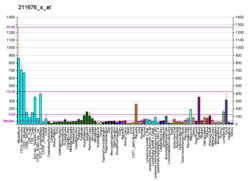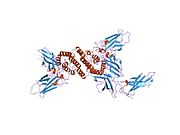Interferon gamma receptor 1
Interferon gamma receptor 1 (IFNGR1) also known as CD119 (Cluster of Differentiation 119), is a protein that in humans is encoded by the IFNGR1 gene.[5][6][7]
Function
[edit]The gene IFNGR1 encodes IFN-γR1, which is the ligand-binding chain (alpha) of the heterodimeric gamma interferon receptor, which is found on macrophages. IFNGR2, encodes IFN-γR2, the non-ligand-binding partner of the heterodimeric receptor.[5]
Interactions
[edit]Interferon gamma receptor 1 has been shown to interact with Interferon-gamma.[8][9]
Mutations
[edit]Mutations in the IFNGR1 gene can lead to extreme susceptibility to Mycobacterial infections.[10][11] All known mutations and common variations in the IFNGR1 are present in the IFNGR1 mutation database.[12][13]
See also
[edit]References
[edit]- ^ a b c GRCh38: Ensembl release 89: ENSG00000027697 – Ensembl, May 2017
- ^ a b c GRCm38: Ensembl release 89: ENSMUSG00000020009 – Ensembl, May 2017
- ^ "Human PubMed Reference:". National Center for Biotechnology Information, U.S. National Library of Medicine.
- ^ "Mouse PubMed Reference:". National Center for Biotechnology Information, U.S. National Library of Medicine.
- ^ a b "Entrez Gene: IFNGR1 interferon gamma receptor 1".
- ^ Novick D, Orchansky P, Revel M, Rubinstein M (Jun 1987). "The human interferon-gamma receptor. Purification, characterization, and preparation of antibodies". The Journal of Biological Chemistry. 262 (18): 8483–7. doi:10.1016/S0021-9258(18)47439-X. PMID 2954953.
- ^ Aguet M, Dembić Z, Merlin G (Oct 1988). "Molecular cloning and expression of the human interferon-gamma receptor". Cell. 55 (2): 273–80. doi:10.1016/0092-8674(88)90050-5. PMID 2971451. S2CID 54247636.
- ^ Thiel DJ, le Du MH, Walter RL, D'Arcy A, Chène C, Fountoulakis M, Garotta G, Winkler FK, Ealick SE (Sep 2000). "Observation of an unexpected third receptor molecule in the crystal structure of human interferon-gamma receptor complex". Structure. 8 (9): 927–36. doi:10.1016/S0969-2126(00)00184-2. PMID 10986460.
- ^ Kotenko SV, Izotova LS, Pollack BP, Mariano TM, Donnelly RJ, Muthukumaran G, Cook JR, Garotta G, Silvennoinen O, Ihle JN (Sep 1995). "Interaction between the components of the interferon gamma receptor complex". The Journal of Biological Chemistry. 270 (36): 20915–21. doi:10.1074/jbc.270.36.20915. PMID 7673114.
- ^ Online Mendelian Inheritance in Man (OMIM): Immunodeficiency 27B; IMD27B - 615978
- ^ van de Vosse E, van Dissel JT, Ottenhoff TH (2009). "Genetic deficiencies of innate immune signalling in human infectious disease". The Lancet. Infectious Diseases. 9 (11): 688–98. doi:10.1016/S1473-3099(09)70255-5. PMID 19850227.
- ^ "IFNGR1". LOVD database.
- ^ van de Vosse E, van Dissel JT (2017). "IFN-γR1 defects: Mutation update and description of the IFNGR1 variation database". Human Mutation. 38 (10): 1286–1296. doi:10.1002/humu.23302. PMID 28744922. S2CID 205923902.
Further reading
[edit]- Samuel CE (Oct 2001). "Antiviral actions of interferons". Clinical Microbiology Reviews. 14 (4): 778–809, table of contents. doi:10.1128/CMR.14.4.778-809.2001. PMC 89003. PMID 11585785.
- van Loon AP, Ozmen L, Fountoulakis M, Kania M, Haiker M, Garotta G (May 1991). "High-affinity receptor for interferon-gamma (IFN-gamma), a ubiquitous protein occurring in different molecular forms on human cells: blood monocytes and eleven different cell lines have the same IFN-gamma receptor protein". Journal of Leukocyte Biology. 49 (5): 462–73. doi:10.1002/jlb.49.5.462. PMID 1826725. S2CID 23547270.
- Le Coniat M, Alcaide-Loridan C, Fellous M, Berger R (Dec 1989). "Human interferon gamma receptor 1 (IFNGR1) gene maps to chromosome region 6q23-6q24". Human Genetics. 84 (1): 92–4. doi:10.1007/BF00210682. PMID 2532616. S2CID 29835482.
- Novick D, Orchansky P, Revel M, Rubinstein M (Jun 1987). "The human interferon-gamma receptor. Purification, characterization, and preparation of antibodies". The Journal of Biological Chemistry. 262 (18): 8483–7. doi:10.1016/S0021-9258(18)47439-X. PMID 2954953.
- Aguet M, Dembić Z, Merlin G (Oct 1988). "Molecular cloning and expression of the human interferon-gamma receptor". Cell. 55 (2): 273–80. doi:10.1016/0092-8674(88)90050-5. PMID 2971451. S2CID 54247636.
- Szente BE, Subramaniam PS, Johnson HM (Dec 1995). "Identification of IFN-gamma receptor binding sites for JAK2 and enhancement of binding by IFN-gamma and its C-terminal peptide IFN-gamma(95-133)". Journal of Immunology. 155 (12): 5617–22. doi:10.4049/jimmunol.155.12.5617. PMID 7499845.
- Igarashi K, Garotta G, Ozmen L, Ziemiecki A, Wilks AF, Harpur AG, Larner AC, Finbloom DS (May 1994). "Interferon-gamma induces tyrosine phosphorylation of interferon-gamma receptor and regulated association of protein tyrosine kinases, Jak1 and Jak2, with its receptor". The Journal of Biological Chemistry. 269 (20): 14333–6. doi:10.1016/S0021-9258(17)36621-8. PMID 7514165.
- Walter MR, Windsor WT, Nagabhushan TL, Lundell DJ, Lunn CA, Zauodny PJ, Narula SK (Jul 1995). "Crystal structure of a complex between interferon-gamma and its soluble high-affinity receptor". Nature. 376 (6537): 230–5. Bibcode:1995Natur.376..230W. doi:10.1038/376230a0. PMID 7617032. S2CID 12387899.
- Kotenko SV, Izotova LS, Pollack BP, Mariano TM, Donnelly RJ, Muthukumaran G, Cook JR, Garotta G, Silvennoinen O, Ihle JN (Sep 1995). "Interaction between the components of the interferon gamma receptor complex". The Journal of Biological Chemistry. 270 (36): 20915–21. doi:10.1074/jbc.270.36.20915. PMID 7673114.
- Maruyama K, Sugano S (Jan 1994). "Oligo-capping: a simple method to replace the cap structure of eukaryotic mRNAs with oligoribonucleotides". Gene. 138 (1–2): 171–4. doi:10.1016/0378-1119(94)90802-8. PMID 8125298.
- Tjoelker LW, Seyfried CE, Eddy RL, Byers MG, Shows TB, Calderon J, Schreiber RB, Gray PW (Mar 1994). "Human, mouse, and rat calnexin cDNA cloning: identification of potential calcium binding motifs and gene localization to human chromosome 5". Biochemistry. 33 (11): 3229–36. doi:10.1021/bi00177a013. PMID 8136357.
- Greenlund AC, Farrar MA, Viviano BL, Schreiber RD (Apr 1994). "Ligand-induced IFN gamma receptor tyrosine phosphorylation couples the receptor to its signal transduction system (p91)". The EMBO Journal. 13 (7): 1591–600. doi:10.1002/j.1460-2075.1994.tb06422.x. PMC 394989. PMID 8156998.
- Stüber D, Friedlein A, Fountoulakis M, Lahm HW, Garotta G (Mar 1993). "Alignment of disulfide bonds of the extracellular domain of the interferon gamma receptor and investigation of their role in biological activity". Biochemistry. 32 (9): 2423–30. doi:10.1021/bi00060a038. PMID 8443182.
- Dalton DK, Pitts-Meek S, Keshav S, Figari IS, Bradley A, Stewart TA (Mar 1993). "Multiple defects of immune cell function in mice with disrupted interferon-gamma genes". Science. 259 (5102): 1739–42. Bibcode:1993Sci...259.1739D. doi:10.1126/science.8456300. PMID 8456300.
- Novelli F, Giovarelli M, Gentz R, Zucca M, di Pierro F, Garotta G, Forni G (Jun 1993). "Modulation of interferon-gamma receptor during human T lymphocyte alloactivation". European Journal of Immunology. 23 (6): 1226–31. doi:10.1002/eji.1830230605. PMID 8500521. S2CID 83740144.
- Newport MJ, Huxley CM, Huston S, Hawrylowicz CM, Oostra BA, Williamson R, Levin M (Dec 1996). "A mutation in the interferon-gamma-receptor gene and susceptibility to mycobacterial infection". The New England Journal of Medicine. 335 (26): 1941–9. doi:10.1056/NEJM199612263352602. PMID 8960473.
- Jouanguy E, Altare F, Lamhamedi S, Revy P, Emile JF, Newport M, Levin M, Blanche S, Seboun E, Fischer A, Casanova JL (Dec 1996). "Interferon-gamma-receptor deficiency in an infant with fatal bacille Calmette-Guérin infection". The New England Journal of Medicine. 335 (26): 1956–61. doi:10.1056/NEJM199612263352604. PMID 8960475.
- Gerritsma JS, Gerritsen AF, De Ley M, van Es LA, Daha MR (Apr 1997). "Interferon-gamma induces biosynthesis of complement components C2, C4 and factor H by human proximal tubular epithelial cells". Cytokine. 9 (4): 276–83. doi:10.1006/cyto.1996.0164. PMID 9112336.
- Sogabe S, Stuart F, Henke C, Bridges A, Williams G, Birch A, Winkler FK, Robinson JA (Nov 1997). "Neutralizing epitopes on the extracellular interferon gamma receptor (IFNgammaR) alpha-chain characterized by homolog scanning mutagenesis and X-ray crystal structure of the A6 fab-IFNgammaR1-108 complex". Journal of Molecular Biology. 273 (4): 882–97. doi:10.1006/jmbi.1997.1336. PMID 9367779.
- Suzuki Y, Yoshitomo-Nakagawa K, Maruyama K, Suyama A, Sugano S (Oct 1997). "Construction and characterization of a full length-enriched and a 5'-end-enriched cDNA library". Gene. 200 (1–2): 149–56. doi:10.1016/S0378-1119(97)00411-3. PMID 9373149.
External links
[edit]- IFNGR1+protein,+human at the U.S. National Library of Medicine Medical Subject Headings (MeSH)
This article incorporates text from the United States National Library of Medicine, which is in the public domain.










